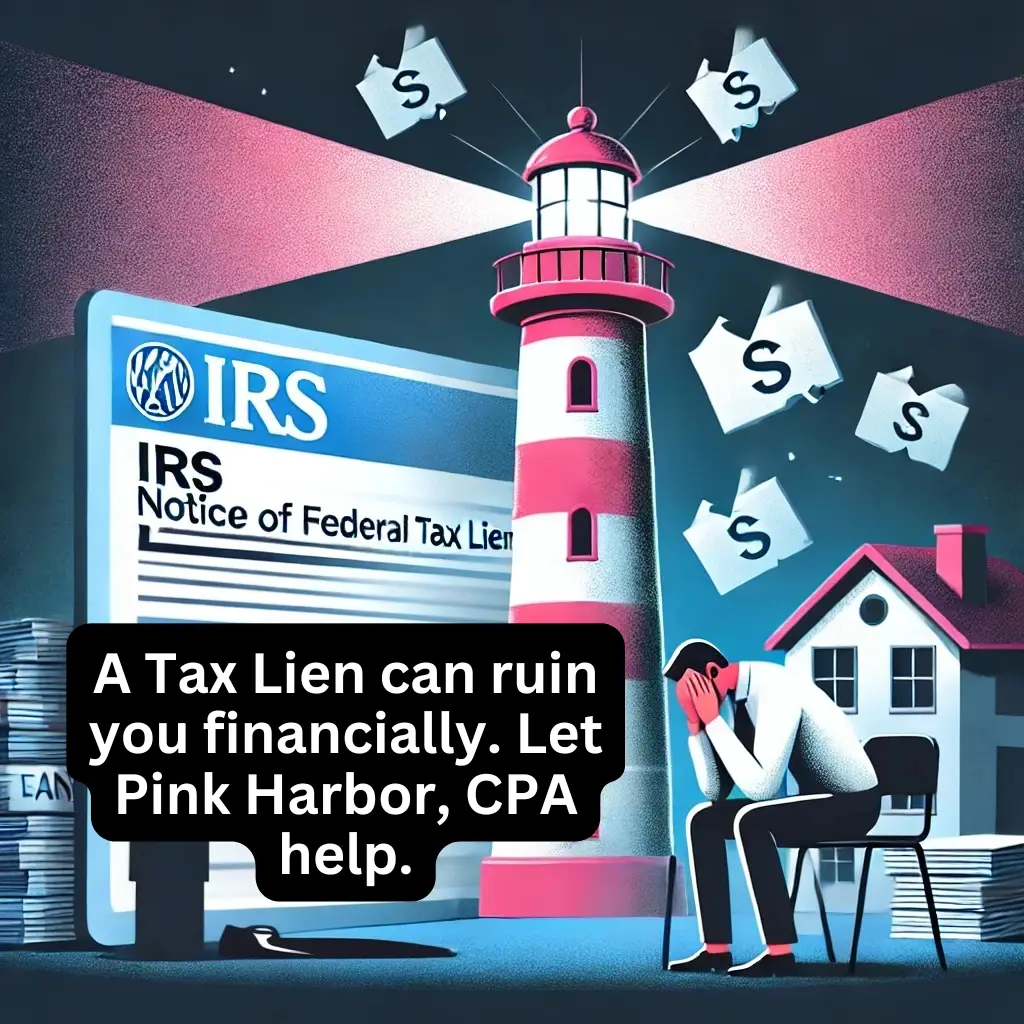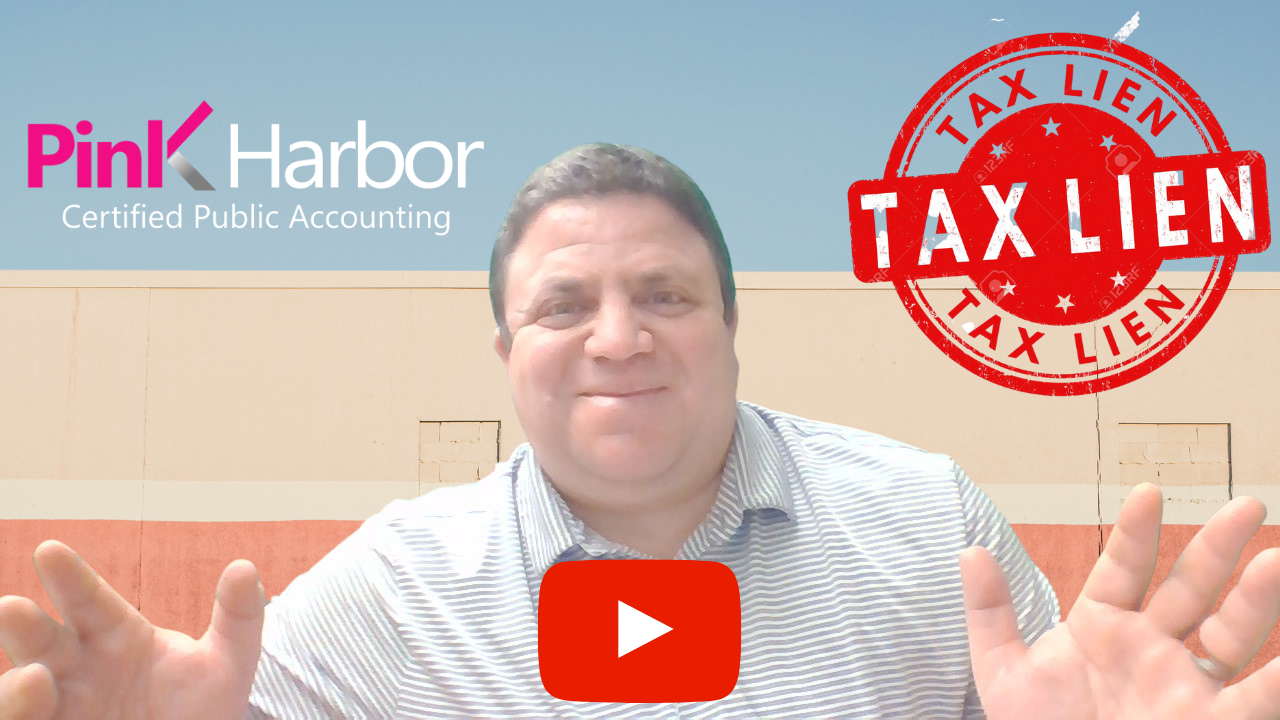
375 North Main Street Suite A-5
Williamstown NJ 08094
(856) 226-9524
mike@pinkharbor.com
Mon - Fri 9 AM - 5 PM
Night & Weekend Hours by Appointment

Williamstown NJ 08094
mike@pinkharbor.com
Night & Weekend Hours by Appointment
An IRS federal tax lien is a public notice that the IRS has placed a legal claim against your property for your unpaid tax debt. The IRS lien protects the government’s interest in all your worldly assets, including your home, automobiles, and bank accounts. Understanding the difference between a federal tax lien and a tax levy is critical—while a lien is a claim, a levy involves seizure. If you currently have or are facing a lien, let’s explore how to get a federal tax lien released, the IRS tax lien statute of limitations, and key steps in resolving the issue. Pink Harbor, CPA is here to help you navigate these challenges, and this page provides answers to your most pressing questions about IRS tax liens. Let us help you regain control of your financial future.

An IRS federal tax lien is when the IRS places a legal claim against your property for your unpaid tax debt. According to 26 U.S. Code § 6321, the IRS must follow certain steps:
For further details, refer to IRS Publication 594, “The IRS Collection Process.”
To get a federal tax lien released, you must pay the total tax debt, including penalties and interest, and satisfy a settlement agreement like an Offer in Compromise or the CSED has passed. According to 26 U.S. Code § 6325, the IRS has 30 days of these events to release the lien. IRS Publication 1450 provides instructions for requesting a Certificate of Release of Federal Tax Lien.
Starting in 2018, a federal tax lien no longer directly affects your credit score. However, a federal tax lien will still show up on title searches or public record searches, and comprehensive background checks. This can stop you from buying a house, car, or any other type of loan. Unless you both filed jointly for the tax debt, a federal tax lien does not typically affect your spouse’s credit worthiness. Find out more by reading IRS Publication 594.
If you sell your home when you have a federal tax lien, the IRS could require that the lien be satisfied before the property can be transferred to the buyer. According to 26 U.S. Code § 6323, the proceeds from the sale of your home will typically go toward paying off the tax debt. The IRS could also allow the sale to proceed while keeping the lien on other assets.
The difference between a federal tax lien and a tax levy is that a lien is viewed as a way for the government to protect its financial interest by placing a legal claim on your assets, while a levy is when the IRS actually seizes your property to satisfy the debt. A levy is enforced under 26 U.S. Code § 6331 and allows the IRS to take your assets to settle the unpaid tax debt.
There are ways to avoid a federal tax lien, including filing your tax returns on time, paying your taxes in full, or setting up a payment plan with the IRS. The IRS could also waive a federal tax lien if you prove that you would lose your job if the lien were placed. Making a settlement offer, such as an Offer in Compromise, can also help prevent a lien from being filed.
To get a federal tax lien payoff amount, you can contact the IRS directly by calling the number on your Notice of Federal Tax Lien, calling 1-800-829-1040, or by submitting a written request to the address provided on the letter 3172, which you received. The federal tax lien payoff amount will be all-inclusive, breaking out the original tax debt, accrued penalties, and interest. IRS Publication 4235 provides additional information on contacting the IRS for lien-related inquiries.
To get a withdrawal of a federal tax lien, you must either pay the tax debt in full, satisfy the offer in a settlement agreement such as an Offer In Compromise, or the Collection Statutory Expiration Date (CSED) has passed.
Federal tax liens typically expire when the CSED date passes, which is generally 10 years from the tax assessment date. However, this period can be extended under certain circumstances, such as bankruptcy or an installment agreement.
IRS federal tax liens are public information because the Notice of Federal Tax Lien is filed with local or state authorities to alert creditors of the government’s legal claim. This information will typically appear in background checks and title searches. IRS Publication 594 provides a detailed explanation of how liens are managed.
A federal tax lien lasts until the tax debt is paid in full, a settlement agreement is satisfied, or the Collection Statutory Expiration Date (CSED) has passed. The CSED date is generally 10 years from the tax assessment date, as specified in 26 U.S. Code § 6502. The IRS can refile a tax lien under certain circumstances; CSED is extended due to an installment agreement or tolling events like bankruptcy. IRS Internal Revenue Manual IRM Section 5.12 provides detailed guidance.
Pink Harbor, CPA offers a variety of IRS tax resolution services designed to help you manage and resolve tax issues. Below are some of the most effective solutions available:
| ✔️ IRS Offer-in-Compromise | Settle your tax debt for less than the full amount owed, based on your financial situation. |
| ✔️ IRS Installment Plans | Spread out your tax payments over time with an installment agreement, making it easier to pay off your debt. |
| ✔️ Filing Back Taxes – Tax Compliance | Ensure compliance by filing past-due tax returns and addressing penalties for late filing. |
| ✔️ IRS Innocent Spouse Relief | Avoid liability for tax debt if your spouse is solely responsible for incorrect or fraudulent reporting. |
| ✔️ IRS Injured Spouse Relief | Reclaim your share of a tax refund that was applied to your spouse’s past debts, such as child support or student loans. |
| ✔️ IRS Penalty & Interest Abatement | Reduce or eliminate IRS penalties and interest if you can prove reasonable cause for late payments or filings. |
| ✔️ IRS Currently Not Collectible Status | Temporarily delay IRS collection activities if you are unable to pay your tax debt due to financial hardship. |
Pink Harbor, CPA provides expert help to resolve a wide range of tax issues. Some of the most common problems we can assist with include:
| 🛡️ IRS Audit Representation | Get professional representation during an IRS audit to ensure your rights are protected and you receive fair treatment. |
| 🛡️ IRS Lien Withdrawal | Remove a tax lien placed on your property and restore your financial standing with the IRS. |
| 🛡️ IRS Levy Release | Stop the IRS from seizing your assets, such as bank accounts or wages, to pay off tax debt. |
| 🛡️ IRS Wage Garnishment Release | Protect your paycheck by stopping or reducing wage garnishment by the IRS. |
| 🛡️ IRS Trust Fund Recovery Relief | Resolve tax issues related to unpaid payroll taxes or trust fund penalties, often incurred by business owners. |
An IRS lien is issued lay legal claim to assets which you may have an ownership interest in. Technically an IRS lien is not collection activity and instead serves to protect the government’s interest in your property. An IRS lien is the prelude to an IRS levy – in which case the IRS begins a process of seizing your assets. It’s imperative that you begin to address a lien as soon as it is filed. And IRS lien which goes unacknowledged can quickly turn into an IRS levy. We quickly get you into compliance by filing any back tax returns which may be outstanding and then we apply various resolution services to quickly resolve your tax problems.


Enter your information below for our FREE e-guide “Pink Harbor CPA’s blueprint to resolving your tax problems.”
